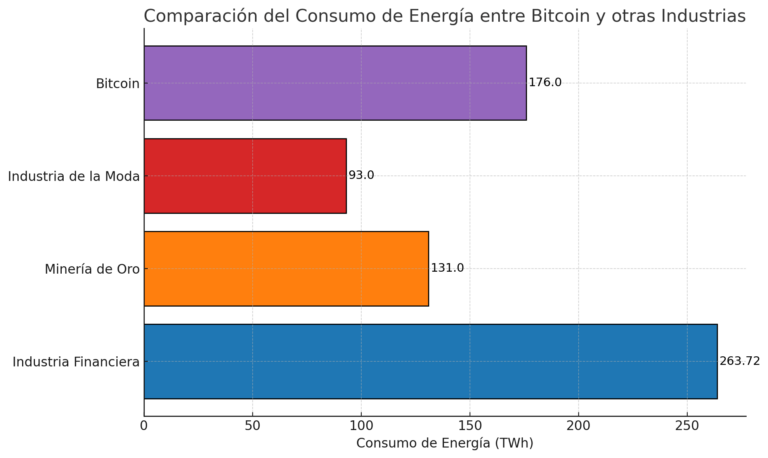
The debate about Bitcoin’s impact on the environment has gained a great deal of attention in recent years. We often hear that Bitcoin consumes more energy than entire countries and that its mining is an ecological catastrophe. However, how much of this is true and how much is exaggeration?
As in any context, the data needs to be put into perspective. In this article, we debunk some of the most common myths and explore the realities of Bitcoin’s environmental impact.

Myth 1: “Bitcoin consumes more energy than entire countries”.
One of the most common arguments against Bitcoin is its energy consumption. In 2019, it was estimated that the cryptocurrency consumed 7.45 gigawatts (GW) of electricity, equivalent to 60.45 terawatt-hours (TWh) per year.
This level of consumption was compared to that of entire countries like Switzerland, Kuwait, Algeria, and Greece, generating alarmist headlines and concerns about Bitcoin’s environmental impact. These data, which were updated every 30 seconds, served as the basis for much criticism.
However, it is crucial to highlight that this data corresponds to 2019, and the energy landscape of Bitcoin has evolved significantly. Today, although energy consumption has increased due to the network’s growth, so has the efficiency and adoption of renewable energy in mining.
In 2024, Bitcoin’s energy consumption reached 176 TWh, but more than 58% of that energy comes from renewable sources, reducing its net impact.
Myth 2: “Bitcoin mining is an ecological catastrophe”.
Another common myth is that Bitcoin mining relies heavily on fossil fuels, particularly coal, making it a highly polluting activity. It is true that, in the past, Bitcoin mining depended largely on coal, especially in China. However, the reality has changed dramatically in recent years.
As mentioned earlier, today more than 58% of the energy used in Bitcoin mining comes from renewable sources. This shift is partly due to the ban on mining in China in 2021, which forced miners to relocate to countries with cleaner energy sources, such as the United States and Canada. Nowadays, the most commonly used energy sources by miners are hydroelectric, wind, and solar power.
Even in places like Ethiopia, Bitcoin mining is carried out using surplus hydroelectric power. This not only makes it sustainable but also helps monetize energy that would otherwise go to waste.
Myth 3: “Bitcoin is unsustainable in the long term”.
One of the arguments raised against Bitcoin is its long-term sustainability. This is due to its high energy consumption and the associated carbon emissions. The Bitcoin mining process has generated concerns about its climate impact, especially with studies showing that in 2021, CO2e emissions per Bitcoin mined increased significantly compared to previous years.
However, this perspective does not take into account recent improvements in efficiency and cost optimization in Bitcoin mining. Since 2022, the industry has begun integrating more advanced technologies and optimizing processes to reduce energy costs. This progress has improved profitability and decreased the per capita environmental impact.
Additionally, there is growing interest in Bitcoin from major financial entities and businesses. This has driven new regulations and clearer policies that encourage more sustainable mining. For example, there is the potential to monetize surplus energy, as is already being explored in countries with energy surpluses like Paraguay.

Comparison with other industries
While Bitcoin does have a notable environmental impact, it is crucial to compare it with other industries for a balanced perspective. Many established industries, such as gold mining and fashion, also have significant carbon footprints and energy consumption.
By its nature, it makes more sense to compare Bitcoin’s impact with that of the global financial industry. This includes banks, data centers, offices, ATMs, and the infrastructure required to keep the financial system running. According to a 2021 study, the traditional banking system consumed more than double the energy of Bitcoin, with 263.72 TWh compared to 176 TWh.
More broadly, Bitcoin’s consumption represents less than 0.1% of global energy consumption. Bitcoin’s trend toward the use of renewable energy and improvements in mining efficiency suggest that its relative impact could continue to decrease in the future.
A viable and sustainable option for payment processing
As you have seen, Bitcoin is not as harmful to the environment as it is often portrayed. In fact, it has the potential to be a positive force for the environment.
The trend toward the use of renewable energy in mining is increasing, and with technological advancements, energy efficiency will continue to improve. Additionally, carbon offset initiatives and reforestation projects are emerging to further mitigate its environmental impact.
The use of the Lightning Network, a second-layer solution on the Bitcoin blockchain, makes transactions much more sustainable. The Lightning Network allows for an almost unlimited number of transactions to be conducted off the main chain. This eliminates the need for each transaction to be confirmed in a mined block, significantly reducing energy consumption. It is, therefore, an even more viable and environmentally friendly option.
In summary, although Bitcoin has an environmental impact, it is no greater than that of other key industries. Moreover, it is continuously improving. The adoption of renewable energy and improvements in efficiency, along with technologies like the Lightning Network, are reducing its carbon footprint, making it a viable and sustainable option for the future.
Are you ready to innovate and add Bitcoin payments to your business?
With ElenPAY, you can integrate Bitcoin securely and easily, taking advantage of Lightning Network’s efficiency and sustainability.
Not only will you be adopting an innovative technology, but you’ll also be aligned with sustainable practices for the future. Plus, you’ll have all the personalized technical support you need to ensure a smooth transition.
Visit our website and request a personalized demo today. Accepting Bitcoin in your business has never been easier or more environmentally conscious.
Leave a Reply